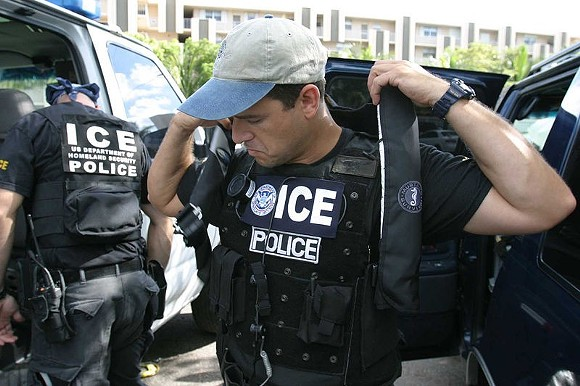Gov. Ron DeSantis’ push to crack down on illegal immigration is slowly expanding the footprint of federal immigration authorities in parts of Florida’s criminal justice system.
U.S. Immigration and Customs Enforcement, known as ICE, now has formal agreements with 49 Florida sheriffs. Probation officers are notifying federal deportation officers about offenders. And a North Florida prison is poised to deputize corrections workers to perform some functions of immigration officers.
The wave of cooperation skyrocketed after DeSantis last summer signed a bill that requires local officials to use “best efforts to support federal immigration law.”
The law is known as a ban on so-called “sanctuary” cities, which DeSantis vowed to outlaw during his 2018 campaign for governor.
Republican backers touted the controversial measure as a requirement to follow federal law. The statute requires local governments to "use their best efforts to support the enforcement of federal immigration law."
Before the law went into effect in July, 14 of the state’s sheriffs had agreements with ICE to train deputies working in county jails to perform some functions of immigration officers.
As of Tuesday, a total of 49 Florida sheriffs had inked some type of agreement with the federal immigration agency.
Pinellas County Sheriff Bob Gualtieri, the president of the Florida Sheriffs Association, told The News Service of Florida that the influx of agreements came, in part, to comply with the new state law.
But participation in federal immigration programs is not required under the law, according to Amien Kacou, an immigration attorney with the American Civil Liberties Union of Florida.
“That’s a misrepresentation of the law,” Kacou said. “The whole point of these agreements is really to force multiplication and shortcuts. That’s been the easiest way for ICE to get people without actually putting in the work and doing what is necessary.”
Under the Florida law, local officials cannot prohibit a law enforcement agency from “participating in any program or agreement” authorized under the federal 287(g) program, which includes agreements sheriffs are using.
ICE spokeswoman Tamara Spicer said that, while not all of Florida's 67 counties have an agreement, all jails are complying with ICE “detainers,” which are requests from ICE told hold suspected undocumented immigrants in county jails until immigration officers pick them up.
Sheriffs run 58 jails in Florida, and nine are operated by county governments.
At the state level, a federal advisory aboard has "reviewed and approved" the Northwest Florida Reception Center in Washington County to participate in an ICE-supervised program. Corrections officials said last November the program will help correctional officers at the state prison to “identify and process criminal aliens who may pose a risk to public safety in Florida.”
The agreement is “awaiting signature” from ICE, Sean Stephens, an ICE official, wrote to the corrections department in an email last December. The federal agency has not formally approved the agreement yet.
Attorney General Ashley Moody’s office, which is authorized to sue entities that violate the 2019 law, has received a single complaint about non-compliance since the law went into effect last year, according to Lauren Cassedy, a spokeswoman for Moody.
The complaint accused Broward County commissioners of having a “twisted political agenda” to help “illegal aliens,” Cassedy said. But the complaint was not investigated due to a lack of detail, she added.
“We currently do not have an investigation. Our office stands ready to enforce the law,” Cassedy said.
The 2019 law expanded cooperation between sheriffs’ offices and federal immigration authorities in a criminal justice system where coordination already existed.
State probation officers began coordinating with federal immigration authorities before the law went into effect, the Florida Department of Corrections said.
Probation workers gave federal deportation officers the home addresses and telephone numbers of people on probation, emails obtained by the News Service showed.
For example, a week before a man on probation was scheduled to meet with senior probation officer Felipe Morcillo, the Florida corrections worker alerted ICE.
“He (the offender) is unable to come in earlier because he works with a construction crew, but here is his address,” Morcillo wrote in a January 2019 email to John Hardisson Jr., a federal deportation officer.
A few months later, Morcillo shared Hardisson’s contact information with another probation officer.
“This is the guy who is picking up one of my dudes,” Morcillo wrote in June 2019.
In another instance, Dawn Scott-Springer, a state probation officer conducting a pre-sentencing investigation, flagged a Hispanic inmate being held at the Pasco County jail, in a message to deportation officer Anoop Mathura.
“Our records seem to indicate that the mentioned subject may have naturalized and is now a U.S. citizen,” Mathura wrote to Scott-Springer in June 2019.
But Mathura encouraged the probation officer to pursue the matter with the Pasco County jail, which has an agreement with ICE.
“Since the subject is currently in the Pasco County jail, I would strongly encourage you to reach out to one of the DIOs (designated immigration officers) to confirm the subject’s immigration status,” Mathura wrote.
Last year, Pasco County Sheriff Chris Nocco’s agreement with ICE resulted in the deportation of 40 “foreign nationals” who had been identified through the program, ICE spokeswoman Spicer said in an email.
Public safety “is best served when law enforcement works together,” Spicer said.
“The local deportation officer referred the probation officer to the designated immigration officer that would have the most current information in that particular case,” she added.
But Kacou said the email exchanges were troubling.
Probation officers are meant to “help people stay out of trouble, instead of trying to get rid of them,” he said.
Support local journalism in these crazy days. Our small but mighty team is working tirelessly to bring you up to the minute news on how Coronavirus is affecting Tampa and surrounding areas. Please consider making a one time or monthly donation to help support our staff. Every little bit helps.
Follow @cl_tampabay on Twitter to get the most up-to-date news + views. Subscribe to our newsletter, too.


